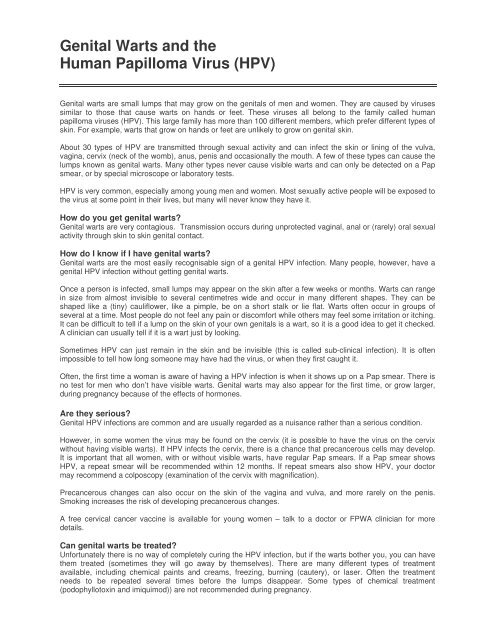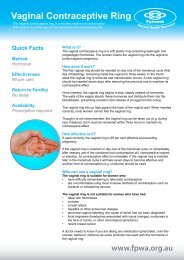Genital Warts and the Human Papilloma Virus (HPV) - FPWA Sexual ...
Genital Warts and the Human Papilloma Virus (HPV) - FPWA Sexual ...
Genital Warts and the Human Papilloma Virus (HPV) - FPWA Sexual ...
Create successful ePaper yourself
Turn your PDF publications into a flip-book with our unique Google optimized e-Paper software.
<strong>Genital</strong> <strong>Warts</strong> <strong>and</strong> <strong>the</strong><br />
<strong>Human</strong> <strong>Papilloma</strong> <strong>Virus</strong> (<strong>HPV</strong>)<br />
<strong>Genital</strong> warts are small lumps that may grow on <strong>the</strong> genitals of men <strong>and</strong> women. They are caused by viruses<br />
similar to those that cause warts on h<strong>and</strong>s or feet. These viruses all belong to <strong>the</strong> family called human<br />
papilloma viruses (<strong>HPV</strong>). This large family has more than 100 different members, which prefer different types of<br />
skin. For example, warts that grow on h<strong>and</strong>s or feet are unlikely to grow on genital skin.<br />
About 30 types of <strong>HPV</strong> are transmitted through sexual activity <strong>and</strong> can infect <strong>the</strong> skin or lining of <strong>the</strong> vulva,<br />
vagina, cervix (neck of <strong>the</strong> womb), anus, penis <strong>and</strong> occasionally <strong>the</strong> mouth. A few of <strong>the</strong>se types can cause <strong>the</strong><br />
lumps known as genital warts. Many o<strong>the</strong>r types never cause visible warts <strong>and</strong> can only be detected on a Pap<br />
smear, or by special microscope or laboratory tests.<br />
<strong>HPV</strong> is very common, especially among young men <strong>and</strong> women. Most sexually active people will be exposed to<br />
<strong>the</strong> virus at some point in <strong>the</strong>ir lives, but many will never know <strong>the</strong>y have it.<br />
How do you get genital warts?<br />
<strong>Genital</strong> warts are very contagious. Transmission occurs during unprotected vaginal, anal or (rarely) oral sexual<br />
activity through skin to skin genital contact.<br />
How do I know if I have genital warts?<br />
<strong>Genital</strong> warts are <strong>the</strong> most easily recognisable sign of a genital <strong>HPV</strong> infection. Many people, however, have a<br />
genital <strong>HPV</strong> infection without getting genital warts.<br />
Once a person is infected, small lumps may appear on <strong>the</strong> skin after a few weeks or months. <strong>Warts</strong> can range<br />
in size from almost invisible to several centimetres wide <strong>and</strong> occur in many different shapes. They can be<br />
shaped like a (tiny) cauliflower, like a pimple, be on a short stalk or lie flat. <strong>Warts</strong> often occur in groups of<br />
several at a time. Most people do not feel any pain or discomfort while o<strong>the</strong>rs may feel some irritation or itching.<br />
It can be difficult to tell if a lump on <strong>the</strong> skin of your own genitals is a wart, so it is a good idea to get it checked.<br />
A clinician can usually tell if it is a wart just by looking.<br />
Sometimes <strong>HPV</strong> can just remain in <strong>the</strong> skin <strong>and</strong> be invisible (this is called sub-clinical infection). It is often<br />
impossible to tell how long someone may have had <strong>the</strong> virus, or when <strong>the</strong>y first caught it.<br />
Often, <strong>the</strong> first time a woman is aware of having a <strong>HPV</strong> infection is when it shows up on a Pap smear. There is<br />
no test for men who don’t have visible warts. <strong>Genital</strong> warts may also appear for <strong>the</strong> first time, or grow larger,<br />
during pregnancy because of <strong>the</strong> effects of hormones.<br />
Are <strong>the</strong>y serious?<br />
<strong>Genital</strong> <strong>HPV</strong> infections are common <strong>and</strong> are usually regarded as a nuisance ra<strong>the</strong>r than a serious condition.<br />
However, in some women <strong>the</strong> virus may be found on <strong>the</strong> cervix (it is possible to have <strong>the</strong> virus on <strong>the</strong> cervix<br />
without having visible warts). If <strong>HPV</strong> infects <strong>the</strong> cervix, <strong>the</strong>re is a chance that precancerous cells may develop.<br />
It is important that all women, with or without visible warts, have regular Pap smears. If a Pap smear shows<br />
<strong>HPV</strong>, a repeat smear will be recommended within 12 months. If repeat smears also show <strong>HPV</strong>, your doctor<br />
may recommend a colposcopy (examination of <strong>the</strong> cervix with magnification).<br />
Precancerous changes can also occur on <strong>the</strong> skin of <strong>the</strong> vagina <strong>and</strong> vulva, <strong>and</strong> more rarely on <strong>the</strong> penis.<br />
Smoking increases <strong>the</strong> risk of developing precancerous changes.<br />
A free cervical cancer vaccine is available for young women – talk to a doctor or <strong>FPWA</strong> clinician for more<br />
details.<br />
Can genital warts be treated?<br />
Unfortunately <strong>the</strong>re is no way of completely curing <strong>the</strong> <strong>HPV</strong> infection, but if <strong>the</strong> warts bo<strong>the</strong>r you, you can have<br />
<strong>the</strong>m treated (sometimes <strong>the</strong>y will go away by <strong>the</strong>mselves). There are many different types of treatment<br />
available, including chemical paints <strong>and</strong> creams, freezing, burning (cautery), or laser. Often <strong>the</strong> treatment<br />
needs to be repeated several times before <strong>the</strong> lumps disappear. Some types of chemical treatment<br />
(podophyllotoxin <strong>and</strong> imiquimod)) are not recommended during pregnancy.
After having <strong>the</strong> warts treated <strong>the</strong>re may still be some of <strong>the</strong> virus left in <strong>the</strong> skin. If this happens <strong>the</strong>re is a<br />
chance that <strong>the</strong> virus will become active again sometime in <strong>the</strong> future <strong>and</strong> warts may reoccur. This may<br />
happen if you become ill or run down.<br />
It is important that you keep healthy to help your body fight <strong>the</strong>se viruses. Eat a diet rich in fruits, vegetables<br />
<strong>and</strong> grains; get enough sleep <strong>and</strong> exercise; <strong>and</strong> look at ways of dealing with stress in your daily life. Smoking<br />
cigarettes is believed to stop your body from effectively fighting infections, so quitting is a good idea.<br />
In most cases <strong>the</strong> body gets rid of <strong>the</strong> infection on its own, without any help.<br />
How can I avoid getting genital warts or passing <strong>the</strong>m onto my partner?<br />
<strong>Genital</strong> warts are very easily transmitted. Using condoms <strong>and</strong> dams (a thin latex square held over <strong>the</strong> vaginal<br />
or anal area during oral sex) provides some protection, but <strong>the</strong>y only protect <strong>the</strong> area of skin <strong>the</strong>y cover.<br />
Remember many people carry <strong>HPV</strong> but it is invisible, <strong>and</strong> you can catch it from a person whose skin looks<br />
perfectly healthy. The more people you have sex with, <strong>the</strong> more likely you are to come into contact with<br />
someone who has genital warts or o<strong>the</strong>r sexually transmissible infections (STIs).<br />
If you have, or have had, genital warts, you may be concerned about passing <strong>the</strong> virus on to a new partner.<br />
This is possible while <strong>the</strong> virus remains in <strong>the</strong> skin. Unfortunately it is impossible to tell how long this will be for.<br />
If you have been with your partner for a while, <strong>and</strong> have been having unprotected sex, <strong>the</strong>n it is likely that both<br />
of you already have <strong>the</strong> same virus.<br />
Consider avoiding sex, especially with a new partner, when you have visible warts, as this is when you are<br />
most infectious.<br />
It may be difficult, but it is a good idea to talk to your partner about genital warts.<br />
Is <strong>the</strong>re anything else I should know?<br />
Many people are shocked, or experience o<strong>the</strong>r strong feelings when <strong>the</strong>y discover <strong>the</strong>y have genital warts or<br />
<strong>HPV</strong>. If you are feeling distressed, it is important to talk to your doctor, nurse or a counsellor for fur<strong>the</strong>r<br />
information <strong>and</strong> support.<br />
Your clinician may advise you to be tested for o<strong>the</strong>r STIs. A woman will be offered a Pap smear also if she<br />
hasn't had one recently.<br />
For more information about genital warts or <strong>HPV</strong> contact <strong>the</strong> <strong>Sexual</strong> Health Helpline on<br />
9227 6178 or 1800 198 205 (country callers) or email sexhelp@fpwa.org.au<br />
Practising safe sex reduces <strong>the</strong> risk of contracting HIV <strong>and</strong> o<strong>the</strong>r sexually transmissible infections<br />
(STIs).<br />
70 Roe Street, PO Box 141, Northbridge, WA, 6865<br />
ph: (08) 9227 6177 fax: (08) 9227 6871<br />
www.fpwa.org.au<br />
info@fpwa.org.au<br />
<strong>Sexual</strong> Health Helpline (08) 92276178 or 1800 198 205 (Country Callers)<br />
sexhelp@fpwa.org.au<br />
Quarry Health Centre for under 25s<br />
7 Quarry Street, PO Box 378, Fremantle, WA, 6959<br />
ph: (08) 9430 4544 fax: (08) 9430 4544<br />
quarry@fpwa org.au<br />
Family Planning Association of WA (Inc) March 2007
















